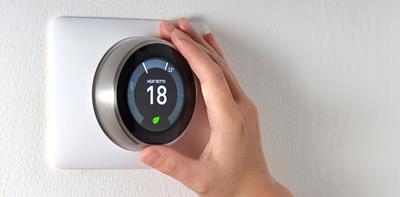
The government is offering grants to encourage homeowners to install heat pumps when it’s time to replace their older gas boilers. Find out how much a heat pump costs to install, if you qualify for a heat pump grant and how to apply.
Easy as hack
Heat pump grants of up to £7,500 are available to help make your home greener and more energy efficient.
At a glance
- Many homes are eligible for a heat pump grant
- Additional modifications to your home heating may be needed first
- Your chosen MSC-certified installer applies for the heat pump grant on your behalf
What is a heat pump?
Heat pumps are an environmentally friendly alternative to gas boilers designed to heat homes and buildings. They produce more energy than they use.
A heat pump captures natural heat from outside and, using clever technology powered by electricity, moves it into your home. The heat can then be used in your home’s central heating system. As a heat pump captures heat that is already present in the environment, the system itself emits no carbon dioxide emissions.
What are the different types of heat pumps?
The two main types of domestic heat pumps that are currently available are:
- Air-to-water heat pumps (ASHP) – these absorb heat from the outside air – even when it’s freezing cold outside. These are the most common type of domestic heat pump in the UK. They are fairly easy to install and don’t take up too much space.
- Ground source heat pumps (GSHP) – these use water-filled pipes buried underground to extract natural, consistent heat from the ground. Ground source heat pumps can be more expensive to install. For this type of system, you need enough outside space to dig a trench or drill boreholes.
Water source heat pumps (WSHP) are a type of ground source heat pump that draw heat from a nearby water source.
How much does a heat pump cost?
The Energy Saving Trust [1] quotes a starting price of £14,000 to install an air source heat pump, which is roughly the same price British Gas [2] quoted in 2023 (£13,190). Checkatrade [3] quotes a starting price of £18,000. If you’re eligible for a heat pump grant, this will bring the total cost down.
The exact cost of a heat pump will vary based on the size and type of heat pump, and the size of your home.
In older properties, radiators may need to be upgraded, or insulation added before a heat pump can be installed. Generally, it’s simpler and cheaper to install a heat pump in a new build property. An initial survey of your property will give you a realistic figure.
What heat pump grants are available?
In England and Wales, the Boiler Upgrade Scheme (BUS) offers heat pump grants for eligible households. The government funds heat pumps and ground source heat pump grants of up to £7,500.
The ground source heat pump grant includes water source heat pumps and those on shared ground loops.
In Scotland, the Home Energy Scotland (HES) grant and loan scheme offers eligible households heat pump grants of up to £7,500 plus interest-free loans of up to £7,500.
In Northern Ireland, there is no heat pump scheme or subsidy. Find out about other energy efficiency schemes for homeowners in Northern Ireland.
Who can get a heat pump grant?
If you’re interested in a heat pump government grant, there are several things you need to know.
- In England and Wales, only homeowners can apply for a heat pump grant. If you’re renting your home, your landlord needs to apply for the grant.
- To be eligible for a heat pump grant, you must be replacing an existing fossil fuel system, not a heat pump or previous renewable system.
- Your property must have an Energy Performance Certificate (EPC) issued in the last 10 years.
- The heat pump installer you choose must be a member of the Microgeneration Certification Scheme (MSC certified).
If you live in a rural area and you’re not connected to the gas grid, you may be able to use the grant to get £5,000 towards a biomass boiler [4].
What are the exclusions to the heat pump grant?
There are some exclusions to heat pump grants in England and Wales. You can’t get a grant for a heat pump if:
- You live in a new build property (self-built properties are eligible to apply [5]).
- You live in social housing.
- You’re renting – you need to ask your landlord to apply for the heat pump grant.
- Your home has a poor EPC rating.
- You’ve had a heat pump grant before.
- You’re applying to install a hybrid heat pump system.
Large commercial properties are not eligible for heat pump grants (however, small business properties can apply [6], so check if your property is eligible).
Previously, your home needed to have existing loft or cavity wall insulation if you wanted to apply for a heat pump grant. This restriction has been lifted to enable more people to benefit from renewable energy options. However, it is still a good idea to make sure your home is well insulated and energy efficient.
Will a heat pump grant cover all of the costs?
Costs for a heat pump will vary based on several factors including:
- The size of your home or property
- How much your existing heating system and radiators need adapting
- Where you live and the cost of labour
For many people the heat pump grant won’t cover the full cost.
If you choose to go through a big energy provider like E.ON or Octopus, you may find they offer benefits, like a payment plan, or reduced installation costs.
How to apply for the heat pump grant?
The heat pump installer applies for the grant on your behalf. They will charge you the installation cost minus the grant.
- Find the right heat pump grant scheme and check your eligibility
- Get heat pump quotes from MSC-certified installers
- Ask the installer to apply for the grant on your behalf
- Give your consent to Ofgem
- Your heat pump can be installed once the grant is approved
- The installer invoices you the reduced amount and claims back the grant directly from the government
Apply for a heat pump government grant
Are heat pumps a good idea?
In a typical household, over half of the fuel bills are spent on heating and hot water [7]. An efficient heating system, like a heat pump, could certainly help to reduce your fuel bills and reduce your carbon emissions.
As Greg Jackson, CEO and founder of Octopus Energy, explained [8], responding to the news of the government grants for heat pumps: “Electric heat pumps are more efficient, safer and cleaner than gas boilers and can help make homes more comfortable with less energy.”
However, heat pumps might not be right for everyone and there have been some criticisms of the new incentive.
Consumer group Which? warned that even with a grant, heat pumps can be costly and inconvenient to install [9]. They also work best in homes with properly insulated windows, walls and roofs, so they may be inefficient in some UK homes. In addition, heat pumps won’t be suitable for everyone as they must be installed outside, and they require space indoors for a hot-water cylinder.
Other critics say the numbers don’t add up. Although up to 25 million UK homes have gas boilers, the heat pump government grants will fund just 90,000 pumps over three years. Jonny Marshall, senior economist at the Resolution Foundation, said [10] this “falls well short of the 450,000 heat pumps which the Climate Change Committee says need to be installed by 2025 in order to keep the UK on track to cut emissions from our homes in half by 2035.”
Groups such as Greenpeace [11] said the heat pump grant scheme wouldn’t be enough to adequately tackle emissions from homes or support low-income households to switch.
Whatever you decide, it’s good to know what the options are when you’re next thinking about replacing your boiler.
FAQs
Heat pumps are usually considered to be permitted development, meaning you can install them without needing full planning permission.
However, certain conditions must be met for the installation to be considered permitted development.
These include:
- The heat pump must not be above a specified size.
- The pump must not be placed in a front garden or position that would negatively impact neighbours.
- The noise levels of the heat pump must not exceed a certain threshold.
You also may need permission for a heat pump if you live in a listed building.
What happens if your heat pump breaks down?
If your heat pump breaks down, you should speak to your installer. If you are still having issues, you can find more info at the Microgeneration Certification Scheme (MCS) website.
Does a heat pump replace a boiler?
Yes, many people who install heat pumps choose to do so when their current fossil fuel boiler is at the end of its life. If you have a heat pump, you do not need a boiler.
Do heat pumps improve your EPC rating?
Yes, heat pumps can improve your home’s EPC rating – particularly if you're replacing an older, less efficient heating system, like a gas or oil boiler, with a more energy-efficient heat pump.
Find out more about our home Insurance.
- https://energysavingtrust.org.uk/heat-pump-installation-a-step-by-step-guide
- https://www.britishgas.co.uk/heating/guides/air-source-heat-pump-cost.html
- https://www.checkatrade.com/blog/cost-guides/ground-source-heat-pump-cost/
- https://www.find-government-grants.service.gov.uk/grants/boiler-upgrade-scheme-1#eligibility
- https://energysavingtrust.org.uk/grants-and-loans/boiler-upgrade-scheme/
- https://www.find-government-grants.service.gov.uk/grants/boiler-upgrade-scheme-1
- https://energysavingtrust.org.uk/energy-at-home/heating-your-home/
- https://sustainablebusinessmagazine.net/finance/heat-pump-grants-worth-5000-announced-by-uk-government/
- https://www.which.co.uk/news/2021/10/5000-heat-pump-grants-revealed-in-new-boiler-upgrade-scheme/
- https://www.resolutionfoundation.org/press-releases/government-right-to-prioritise-low-income-families-in-heat-and-buildings-strategy-but-still-risks-falling-short-of-target-to-halve-home-carbon-emissions-by-2035/
- https://www.greenpeace.org.uk/news/greenpeace-reaction-to-governments-boiler-ban-good-but-not-good-enough/


